K.A. Wiggins's Blog, page 7
November 30, 2021
Feb2 WRAD Virtual Reading
Date: February 2, 2022
Time: 9am - 8pm PST
Location: your classroom, library, or book club via Zoom (or similar)
Type: Live Reading
World Read Aloud Day is a ���celebration of the power of reading aloud to create community, to amplify new stories, and to advocate for literacy as a foundational human right.���
As creators of books for young readers, many members of CWILL BC are offering free 10-20 min. virtual readings in support of this wonderful cause.
While I���m more than happy to present to classrooms, library groups or book clubs of all ages, I write for ages 8+ (published YA + forthcoming MG), so for elementary school groups, I���d be happy to read from an age-appropriate Canadian children���s book that inspires me.
Shoot me a message at kaiewrites@gmail.com to book a free 10-20 minute reading + author visit on February 3, 2021!
November 29, 2021
Pop-up Book Sale in Vancouver
Date: December 11, 2021
Time: 4pm - 7pm PST
Location: Academie Duello at 412 West Hastings, Vancouver, BC
Type: Book and Craft Sale + Live Reading
Fantastic BC small press Pulp Literature is hosting a local author book (+craft+art) sale in the super cool and spacious Academie Duello swordplay school space in Gastown and you need to check it out!
It���s open from 4-7 pm, and I���ll be rushing over my workshops end at 5 in Coquitlam, so come say hi if you���re there after 6! My books will be stocked all event, and friends��� books you should definitely also pick up while you���re there include CWILLers Bryce Raffle, Cynthia Heinrichs, and Ellen Schwartz, plus Vancouver-area author Tanya Lisle!
Masks and vaccine passports will be required. It���s a large space, so crowding shouldn���t be an issue.
RSVP on the Facebook event page to help vendors get a sense of how much stock to supply and check out more vendor profiles as they drop over the coming weeks. Hope to see you there! :D
October 28, 2021
Blog Tour & NaNoWriMo
Just a quick heads-up on two new developments before I retreat into heavy-duty drafting mode!
I���ve got a blog tour coming up for Blind the Eyes (as a result of winning the Page Turner Awards tour prize last year) so I���ll have a bunch of interviews and blogs for you to check out in late November to early December.
I also just wanted to offer, if there are any bloggers among my readers who want to get in on the fun (and take advantage of the free content), you can check out all the details and sign up here.
And there���ll be another chance to win a special edition hardcover coming as part of the tour!
2. #NaNoWriMo2021If you���ve never stumbled across National Novel Writing Month before, it���s a now-international challenge to write a novel (or rather, 50,000 words of one) in the month of November. I tried it out way back in the dark days of 2020 and produced most of Burn the Skies, wrapping up the Threads of Dreams series.
This year I���ve got something a little different in mind . . .
View this post on InstagramA post shared by K.A. Wiggins | �������� Bookaholic (@kaie.space)
September 26, 2021
Shop Early
So last week was a little crazy. CBC news caught onto a situation that���s been developing in the publishing world. The tl;dr is that a combination of pandemic and shipping-related issues is making books more expensive and making it hard to stock and nearly impossible to restock physical copies of books on any kind of reasonable timeline.
Spent a few days on correspondence, recorded print/blog & tv interviews and a live radio piece on behalf of CWILL BC members. Decided it might be clearer to just lay things out in my own words. If you want the deep dive, it���s posted over on Medium.
The upshot of all this is that it gave us the kick in the pants we needed to finally launch our (CWILL BC) planned giveaway! If you live in British Columbia, click here to enter to win a stack of kids books in time for the holidays OR a free author or illustrator visit via Zoom.
September 24, 2021
2021 Arty Awards
UPDATE Cannot believe I won!! Thanks to my mystery nominator and the whole council team, volunteers, and supporters!
View this post on InstagramA post shared by K.A. Wiggins | �������� Bookaholic (@kaie.space)
Original Post: September 9:
This was a definite higlight of my summer: someone nominated me in the annual Abbotsford Arts Club Arty Awards!
Congrations to my fellow nominees in the literature category, local authors David Tickner, Julia Rohan, Emily Isaacson, and Lauralee S��:tel ��:la Kelly! The awards ceremony will be held remotely on September 25 at 7 pm.
If you���re a visiting and looking to check out my work in hardcopy, you can find paperbacks locally to borrow through the Fraser Valley Regional Library, or for sale at The Bookman or Hemingways Books and Records. Thanks for reading and shopping local!
Arty Nomination
UPDATE Cannot believe I won!! Thanks to my mystery nominator and the whole council team, volunteers, and supporters!
Honoured (& astonished) to have won first place in the Literary Arts category of @AbbyArtsCouncil 2021 Arty Awards!!����
— K.A. Wiggins wrote a whole series and is tired ���� (@kaiespace) September 26, 2021
Congrats go as well to my amazing fellow nominees and category winners. Catch some great performances in the hilarious & stylish replay: https://t.co/vd5PnGYw5a pic.twitter.com/gJ85PnWDQN
Original Post: September 9:
This was a definite higlight of my summer: someone nominated me in the annual Abbotsford Arts Club Arty Awards!
Congrations to my fellow nominees in the literature category, local authors David Tickner, Julia Rohan, Emily Isaacson, and Lauralee S��:tel ��:la Kelly! The awards ceremony will be held remotely on September 25 at 7 pm.
If you���re a visiting and looking to check out my work in hardcopy, you can find paperbacks locally to borrow through the Fraser Valley Regional Library, or for sale at The Bookman or Hemingways Books and Records. Thanks for reading and shopping local!
September 8, 2021
Arty Nomination
This was a definite higlight of my summer: someone nominated me in the annual Abbotsford Arts Club Arty Awards!
Congrations to my fellow nominees in the literature category, local authors David Tickner, Julia Rohan, Emily Isaacson, and Lauralee S��:tel ��:la Kelly! The awards ceremony will be held remotely on September 25 at 7 pm.
If you���re a visiting and looking to check out my work in hardcopy, you can find paperbacks locally to borrow through the Fraser Valley Regional Library, or for sale at The Bookman or Hemingways Books and Records. Thanks for reading and shopping local!
August 28, 2021
News Round-Up
Aaand just like that, summer���s over! As usual, I���ve been too busy to share updates as they happen, so here���s a quick rundown of what you may have missed:
Threads of Dreams CompleteBurn the Skies launched on July 6, completing the trilogy. Binge the whole series today!
ElectionsThe Children���s Writers and Illustrators of British Columbia society elected me as president on June 30. If you���re a published (or professionally indie publishing) illustrator or author of books for the under-18 crowd living in British Columbia, please join us at cwillbc.org. We���re doing a ton of cool stuff!.
AwardsNot sure I���m allowed to share the news yet, but there���s a super fun awards nomination in the works that I���ll be able to shout about soon. Thanks to whoever nominated me, btw!
Instagram CatastropheOn the not-so-fun news side, my Instagram (@kaie.space) got unexpectedly shut down. Not sure if I got hacked or flagged by bots or something else, but it doesn���t appear to be recoverable. Sad to lose 3,000+ connections and 5+ years of work, but moving on and starting over with a new handle. Join me @kaiewiggins for pretty(?) book photos and book recs featuring YA fantasy and Canadian authors!
Student Showcase & Recommended ResourcesJust launched two new website sections to feature creative projects by emerging writers I���ve had the privilege to teach and compile writing and publishing resources. Between teaching and leading CWILL, I���ve been getting an increasing number of questions about where to start with x or y, so while I���m no publishing guru, hopefully this provides a helpful starting point to refer questions to. It���ll likely grow as I have time and questions increase. Students of past workshops or who I���ve connected with at presentations are welcome to get in touch at any time with a creative project they���d like featured on the showcase page.
Up NextI���m still dithering about what project to dive into next on the writing front, but I���ll be teaching two anthology workshops with Creative Writing for Children in the fall term, growing CWILL BC���s reach and effectiveness, and taking a continuing ed workshop on short fiction with WMG Publishing. Somewhere in all that, I need to plot and draft the next release, genre and title TBD. Stay in touch via the newsletter or social for all the details as they drop!
July 10, 2021
Publishing Overview
Disclaimer: many free resources are provided in hopes that you���ll invest in a product (workshop, book, mentorship program, etc.) Don���t invest in anything until you understand it well enough to know if you���re getting a good deal.
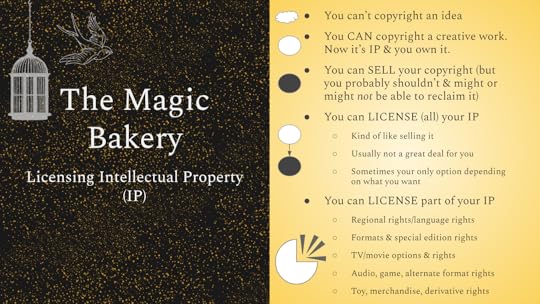
Experienced and prolific author/editor/publisher Dean Wesley Smith talks about the idea of a ���magic bakery��� when it comes to writing. You can read about it in his own words and in this excellent blog by his wife, Kristine Kathryn Rusch. But, in a nutshell, the concept is that intellectual property���like our writing���can be sold over and over, in part and in whole, unlike other goods.
Your work automatically belongs to you from the time of its creation. You own full copyright. (The exception is when you���re writing as work-for-hire, or working on an IP project that belongs to someone else, like a Star Wars tie-in novel, for example.) Technically, you could transfer copyright in a sale (if you sign a terrible contract), but don���t.
Instead, you license the right to use the work in part or in whole. Some examples: Licensing first publication rights in English, then, when the exclusivity period expires, licensing reprint rights (over and over again) or publishing it yourself as a standalone or in a collection. You can also license (and re-license) translation rights, audio rights, production rights (for film/tv), merchandising rights, etc. All that off of one story (potentially).
The moral of the story? Keep your copyright, don���t license more rights than the licensee will use (to your benefit), and make sure your contracts aren���t perpetual (so you can get licensed rights back eventually and re-license them.)
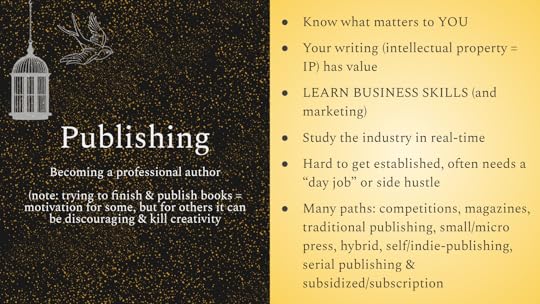
They���re a bigger effort in terms of time, skill, and investment, but novels are not inherently better than any other type of fiction. Try not to feel pressured into writing one if you don���t really want to!
Whatever publishing path you choose, you will become a small business. Like any entrepreneur, you���ll need to learn business skills and keep up on your industry, even if it���s just a side hustle. Do your research as you approach publishing; things change in a matter of months in this industry, much less years, and you don���t want to be launching with outdated intel. See other posts in the Resources section for links to groups and news outlets for staying up to date.
Publishing can pay, but it���s usually a slow and gradual path to earning an income. Royalties can accumulate over time. The opportunity to sell additional licenses may emerge. The more stories/books you have out, the more it all can add up, but that takes time, too. Make a plan for how you���ll survive financially for the first years at least.
Be open to nontraditional routes: serial fiction and subsidized or serialed fiction are looking strong right now. Patreon and Kickstarter are good examples of emerging trends that authors have leveraged to the advantage of their careers.

Not much to add here. This is roughly what I do these days. It���s pretty minimal compared to some, unneccessarily complex compared to others. I can���t quite bring myself to draft-proofread-publish, but I���m not doing multiple rounds of heavy rewrites, either. If I get really stuck on the plotting, I���ll change formats, which can look like any of these:

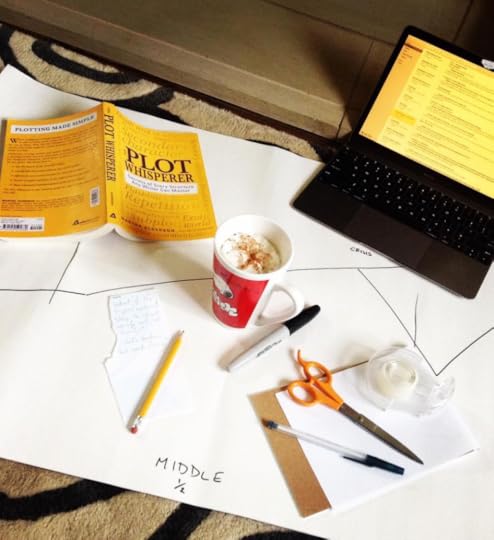
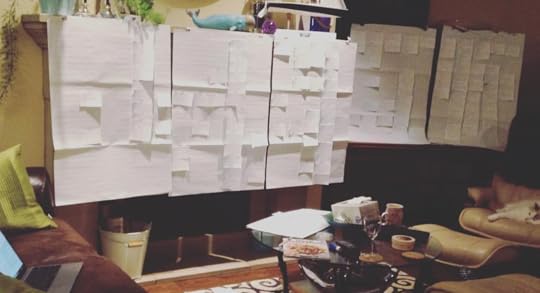
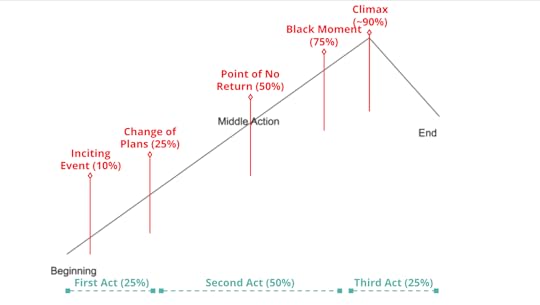
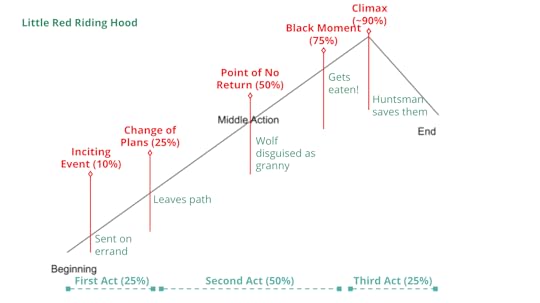 Story Mapping
Story MappingWhile all the charts and cards can look complex, the basic structure I���m using is a three act structure with four quarters.
The first quarter and the first act map together and contain the inciting event early on (at about the 10% mark). Something disrupts the main character���s ordinary life and sends them in a new direction. It ends around the 25% mark with the change of plans turning point. This is where the main character chooses (or gets dragged into) the adventure/quest/journey of the story.
The second act is easiest to understand if you split it evenly in two. The first half is the character struggling to make forward progress and understand their situation/world/challenge/self etc. Around the 50% mark or midpoint turning point (end of the second quarter) they make a discovery or realization that shifts their trajectory.
Now, starting the third quarter, the main character(s) (thinks they) know what they need to do to succeed, though they still face obstacles. The second act/third quarter ends with the black moment turning point, the darkest point of the story, either figuratively or literally involving death. The main character may feel as though they���ve failed, there���s no hope, maybe no point going on. They may be focused on revenge or retribution.
But, into the final quarter/act, they���ll need to rally enough to take on the greatest challenge of the story in the final turning point, the climax. Often this follows a mini arc of setting out, making progress, making a sudden realization that changes their perspective or goal, hitting a ���black moment��� of despair, and then rallying to overcome (in a positive story arc, at least). There���s often an inner and outer component to this, the main character finding inner strength or understanding in order to overcome the outer challenge of the story. The last 10% or so of the final act wraps up the story by showing the new normal���and/or setting up a sequel.
Little Red Riding Hood isn���t the best example because it���s missing main character agency in most variations. Ideally, you want your main character���s actions and choices to be integral to every turning point.
If you hate how structured this all is, welcome to the club. I fought this idea hard���but it really does result in faster drafting and stories readers seem to enjoy more. And there���s tons of room for creativity within this loose structure. Also, those percentages will come in handy in a moment.
 Word count graphics from btleditorial.com & Reedsy.
Word count graphics from btleditorial.com & Reedsy.
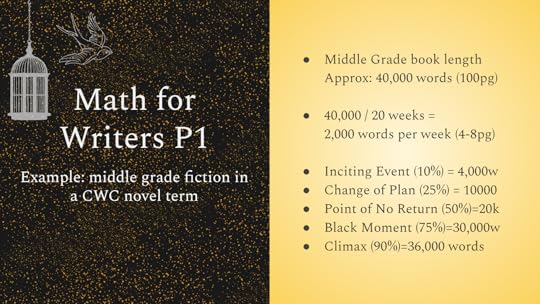
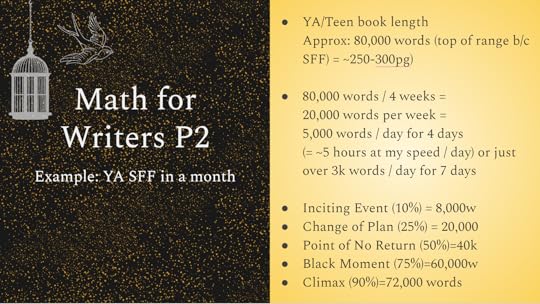 Math For Authors
Math For AuthorsEveryone���s favourite, right? But hang in there, this comes in really handy.
You can apply the turning point percentages we just looked at to a target wordcount (above) to plan how to draft your novel. Pick a target wordcount, jot down some notes about each turning point (or go in blind, if that���s your preference), and track your wordcount as you write.
For instance, if you���re planning an industry-standard middle grade novel (40,000 words, say), as you���re coming up to 15,000 words you know you���ve got the midpoint coming up and you need to get your character in place within the next 5,000 words or 4-5 hours of writing.
If your target is 80k words for a YA fantasy, you���re going to be preparing to write that midpoint as you near 40k words (or try to include an inciting event within the first 8k words, or a black moment around the 60k mark, etc.) These intervals help make stories feel like they���re moving along at a natural clip to western readers who are mostly used to this story pattern. If you���re far off these proportions, it can manifest as portions of the story feeling slow-paced or rushed.
But, as with all writing advice, you can take it or leave it. Other story structures exist. Some writers have stronger instinctual structure, while others find it easier to write to a plan. There���s no one right way, but if you���re not sure where to start, I suggest trying this structure.
July 9, 2021
Short Fiction Overview

This might seem obvious (and it applies to all of publishing, not just short fiction), but it���s actually very important to really dig into what matters to you.
Are you building a long-term career? Do you dream of publishing full time? Do you care more about money or creative freedom or acclaim? Is it really more about getting your stories or ideas out to the world? Do you crave feedback? Is writing really a private pursuit that brings joy to you but that you don���t want the eyes (and opinions) of the world on? Is publishing a path to something else���recognition, acclaim, support for a different eductational or career trajectory?
Your answers may surprise you and/or change over time���which is fine! We all do the best we can and move forward as best we can, making mistakes along the way. But if you can clarify your goals (and dreams and hopes and . . . ) it���ll help you think critically about the information available and choose the most promising path for your needs.
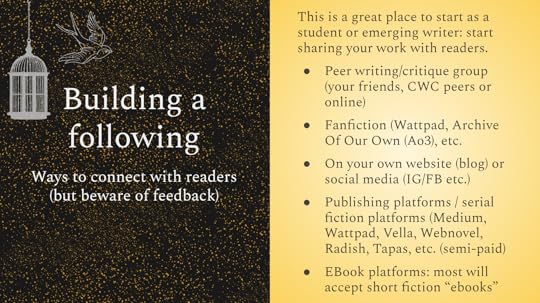
This is vital: if you want to get your work out into the world, that means working with others.
Young writers and newcomers may be used to a more critical perspective on ���literature��� (damage from high school/college lit classes, no doubt), or channel their insecurities into aggression, or simply lack the experience to recognize just what (and to what extent) they don���t yet know.
Time for a change of focus: other writers are now your peers. Not long-dead entities to be picked apart in analysis and critique. Not competitors (even when they are). Not faceless corporations. Real people who you may bump into from time to time, friends, colleagues, possibly even someone who will one day be in a position to help or hurt your career. Proceed accordingly.
Try to adjust your perspective on other emerging writers and readers as well; they���re now potential friends, colleagues, and fans. Be kind. Be helpful. Be professional. Don���t be scared.
You���ll need people who are on your side (or at least willing to lend a hand temporarily) at nearly every step of your writing journey. People who���ll share tips, give feedback (if you ask for it), buy books, write reviews, shout about your books to other readers.
If you intend to publish a book or otherwise care about getting your words out to readers, it���s never too early to start. Nothing published to share yet? Build platforms (website/social media, etc.) around shouting about books you like, ideally ones that are similar to what you hope to write. By the time you���re ready to search for readers, you���ll have contacts who you can share the news with!
And consider starting with something smaller and less resource intensive than a book, especially if you���re a student. Short stories, fanfiction, and serial fiction are a few ways to get your words in front of readers with less pressure. Bite-sized content is a growing market and it���s more doable for you, especially if you���re balancing creating with a busy school or work schedule.
At time of writing, Wattpad and Archive Of Our Own (AO3) are the biggest fanfiction platforms. Use filters to keep content kid-friendly if you���re underage or simply uninterested in the thriving adult content sections. ;)
Quick aside: ALWAYS read the contracts before sharing your work and make sure your rights are protected. More on that in a bit.
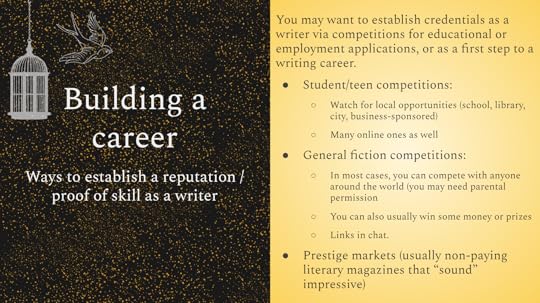
This section was originally intended for students, but writers of all ages can get into sharing their words for reputational purposes.
Students may find it helpful in scholarship, college, or job applications. Adults may simply want the prestige, or use it as a (small) building block to a writing career or a complement to a different field.
Awards and accolades don���t sell lots of books. They can be useful in building a ���brand��� as a writer, however, and may lead to more opportunities or visibility over time.
Larger scale or higher profile awards or story markets can be more beneficial, but the competition will be higher. That���s not to say don���t enter���always take your shot! But local/regional and student-specific competitions/markets will be relatively easier to make a splash in. Also note that certain topics or styles will play better with some judging panels or editors/magazines than others. The closer you match their preferences, the more likely you are to get a ���yes��� and that has nothing to do with skill or quality. (Don���t get discouraged!)
While publishing as a teen may sound promising, it tends to be less of a selling point than you might think. Unless you���re entering a student competition or otherwise required to disclose such details, avoid mentioning your age/grade.
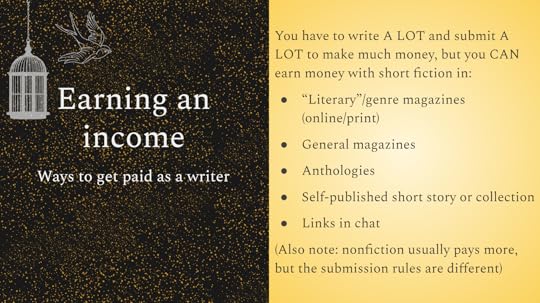
Writing is not known for it���s incredible financial rewards���usually. That doesn���t mean it won���t or can���t pay, but the effort tends not to pay off quickly or reliably. Don���t overreach. The next section dives into rates, but in terms of markets, you can place short stories in competitions, print and/or genre or literary magazines or ���zines, other types of magazines that sometimes include a small fiction segment, anthologies, or individually be self-publishing.
Reading submission guidelines and writing a custom piece in response sometimes results in better (=closer) fits, but you can also just write freely and then look for the right market after the fact. Note that preparing, submitting, and tracking story submissions takes time in its own right, putting further pressure on any income you might recieve.
Nonfiction (particularly business) writing tends to be paid at higher rates, but you normally pitch the idea of a feature or article to an editor before writing, whereas with fiction, you write the whole piece and submit it.
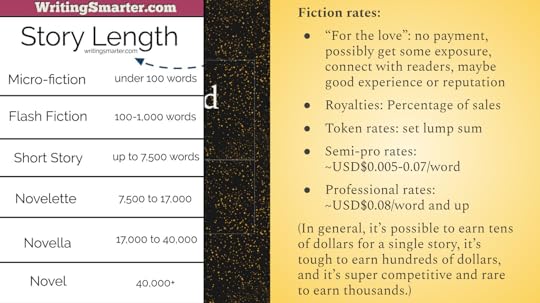
Graphic from writingsmarter.com.
Always ALWAYS read the submission guidelines. There is variation between accepted story lengths and rates of pay. But this works fairly well as a general guideline. Note that professional writers tend to speak in terms of wordcount because page count varies depending on formatting and is an unreliable indicator. We really only use it to speak to readers who are used to thinking in those terms.
Many short fiction ���markets��� do not pay. Some are prestigious; many are new and/or hobby projects for the founder. That doesn���t mean they���re automatically bad! They make be a good stepping stone or practice for beginners, or provide an outlet for those who love sharing their words but aren���t bothered about the income side of things. As usual, always read the terms/contracts/guidelines to make sure you���re not signing away more rights than you mean to.
We���ll look at rights/licensing in a bit, but it���s good to keep in mind that the first sale is usually the most valuable and accessible to make, and consider holding out for a ���higher��� level market. Reprints aren���t as widely accepted in paying markets, and it���s harder work to place them. In general, I recommend shooting high and then working your way down a wishlist of possible story markets until a story lands.
Magazines and other short fiction markets rarely pay on royalties, but the exception is anthologies. Sometimes they���re paid in a lump sum upon signing, but ���royalty-split��� arrangements aren���t uncommon. While your income is therefore unreliable, this can be a good option if you���ve built a platform of readers eager to pay for your work and/or the other authors in the anthology have a strong platform to market to as well.
Token rates are generally in the $5-$40 range, where the market can���t afford more but feels it���s important to pay something. The Science Fiction Fantasy Writers of America (sfwa.org) has set pro rates at $0.08/word, but you���ll see anything from half a cent on up. Some markets also offer lump sum payments in the 100+ range. Generally, the more they pay, the more the competition, but don���t self-reject���the worst they can do is say no!
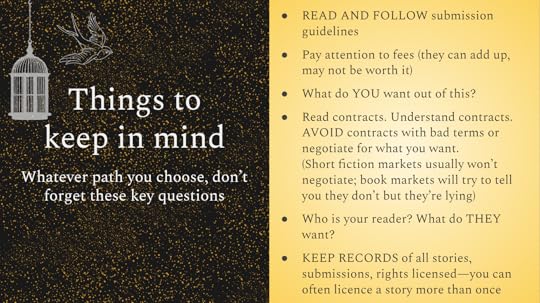
I���ll keep repeating this, but ALWAYS read the submission guidelines and follow them. Your story should be creative; your formatting and document presentation should not be. If no specifics are given, follow Shunn Manuscript Format, modern edition as the default.
Some competitions charge entrance fees. Some writing markets charge reading fees, but far from all. You can spend a lot of money trying to get published, but you don���t have to. Avoid fee-charging markets or competitions unless you think your story has an excellent chance of earning the expense back or unless money is no object.
It���s easy to get caught up in the pursuit. After a few submissions, you just really really want an acceptance. Try to clarify your goals and keep them front and center. Write them down and post them in your workspace if that helps.
On a related note, always read the contract. Some market post a sample one. Most competitions will also post terms. Some ���opportunities��� aren���t. See other posts in the Resources section for links to reading, understanding and negotiating contracts.
Consider the reader(s) before submitting. What kind of reader is likely to appreciate your story (if it���s already written). What might the judges or first readers/editor care about and appreciate? You can research past award-winners or other stories in a magazine to get an idea, but if you���re submitting a lot, it���s not practical to do too much research.
Finally, make yourself a tracking document or spreadsheet early on. Keep track of submissions, contract terms for licensed stories, and details of the stories themselves. This seems silly at first, but if you keep writing and submitting, you���ll quickly get beyond the point where you can keep track in your head.




